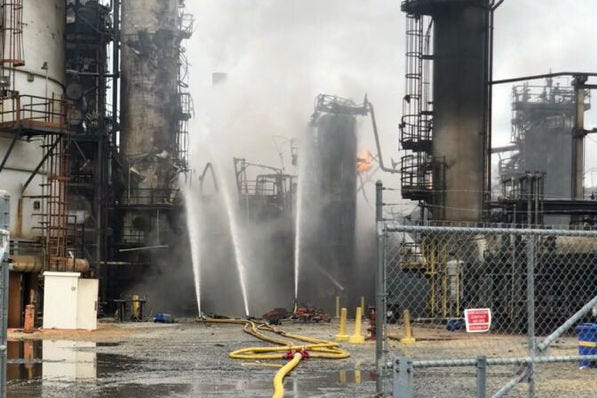
UPDATED: 2:25 p.m.
___
Investigators with OSHA, the ATF, the Philadelphia Fire Department and others are on the case, looking to nail down the cause of the fire that burned Friday morning through Saturday afternoon.
As they do their work, city officials say they've been keeping track of the air quality — and it is safe. But nearby residents aren't so sure.
Neighbors fear the worst
Linda Hitchens is worried. She lives on Newkirk Street. Passyunk Avenue separates the refinery from her neighborhood.
She's concerned about the air she's breathing, and her kids want her to move. But she doesn’t see herself leaving a community she's been a part of for 11 years.
"I like it here," she added. "It's so quiet. And at 70 years old, where am I going?"
The big question she wants an answer to: Will there be any long-term effects from the fire?
Irene Russell, who also lives in the neighborhood, said she and her son both survived cancer, but her brother and sister died of the disease.
She wants reassurance that the plant is EPA compliant, and she wants specifics on air quality.
"I'm hoping that they continue to test it. I'm hoping that they make sure that they're in compliance with what those levels should be," Russell said.
Another refinery neighbor, Mary Stelly, is demanding transparency.
"The people who are over there making money, all that money off the oil and all of that, be honest with us. We're right here. Anything can happen," Stelly said.
Getting some facts on what was burning and on the air quality, Stelly said, would help her stop imagining the worst.
Noncompliance of Clean Air Act
The Clean Air Council says it's time for the City of Philadelphia to start thinking about the future of the aging refinery.
Clean Air Council Executive Director Joe Minott said the complex is old and financially strapped. Economically, he believes it will only last another couple years.
Plus, he said the refinery has not complied with the federal Clean Air Act in at least 36 years. The refinery was originally built in 1866.
"So the question isn't, 'Does it have an impact on the community?' The answer to that is yes," he said. "But the question is, 'Did the fire exacerbate that impact?' And, you know, that information is still unavailable."
PES uses hydrogen fluoride, also known as hydrofluoride. Minott said the gas is extremely dangerous and is only used in a handful of refineries to make high-octane gasoline.
"If nothing else comes out of this fire, it is that this plant needs to stop using this highly, highly flammable and dangerous chemical," he added.
According to the CDC, if the gas comes in contact with skin at high levels, it can cause death from an irregular heart beat. In liquid form, it can affect all internal major organs.
Calls and emails to PES have not been returned.
___

